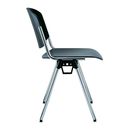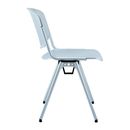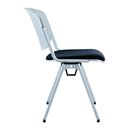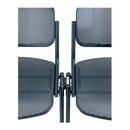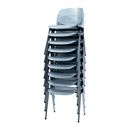Zitmeubelen

SITDOWN
Stapelstoel
Het systeem SITDOWN in gperforeerde staalplaat past zich de actuelle transparante architectuur aan. Verticale stapelbaarheid, transportwagentjes, verschillende geleiders, schrijftabletjes, rijverbindingen, nummering van plaats en rijen, SITDOWN lost al Uw problemen op!
Downloads
- SITDOWN_Productinformation
(325 KB) - DWG_1330.dwg
(3 MB) - DWG_1330_Sitz_und_Ruecken_Spiegelpolster.dwg
(4 MB) - DWG_1330_Vollpolster.dwg
(4 MB)
Frame
Frame from 22 x 2 mm tubular steel. Frame featuring a transversal beam, a 26 x 2 mm receiver tube and a flat transversal connecting bar (30 x 4 mm), tumbled and embossed, equipped with drill holes to accommodate linking elements. The transversal beam has been welded to the frame. Connecting ribs made from 18 x 1.5 mm tubular steel, soldered to the sides. Legs pressed into the transversal receiver tube. Stacking element made from black glass-fibre-reinforced plastic- polyamide, with soft injection-moulded plastic to protect the chairs when stacked (attached by screws to the lower frame). Pipe ends protected by caps, chrome-plated or black depending on the version. Chairs can be vertically stacked.
Frame surfaces
Standard version of the side sections, side bars and crossbeam: powder-coated in black, optionally powder-coated according to the BRUNE® collection or chrome-plated.
Seat and Back 1330
Seat and back support from ergonomically shaped beech plywood, 10 mm thick, attached with multiple layers of glue, edge of the seat turning sharply downward. Seat and back support fastened with flat-head screws and M5 sleeve nuts. Seat and back support optionally available in plywood, seat upholstered or seat and back support upholstered.
Seat and Back 1335
Seat and back support from ergonomically shaped perforated sheet metal, 2.5 mm thick, perforation holes with a diameter of 3 mm, diagonally offset in distances of 6 mm. The front edge of the seat turns sharply downward. The perforated sheet metal seats and back supports are welded to the side brackets (concealed welding joints). Powder-coated in black, optionally powder-coated according to the BRUNE® collection.
Wooden surfaces
Wooden elements made from beech wood, with natural varnish (low-solvent water varnish) in the standard version. Optionally stained according to the BRUNE® collection.
Upholstery Model 1330
Seats or seats and back supports are upholstered, fabric cover according to the BRUNE® collection, fabric categories 3, 4, 6, 7 or 8.
| Seat cushion foam: | SG/CH 35/50 | approx. 25 mm thick | ||
| Back cushion foam: | SG/CH 35/50 | approx. 15 mm thick |
SG = specific gravity, weight per m³. CH = compression hardness (e.g.: 50 ≙ approx. 50 g/cm² at a compression level of 40 %)
Upholstery Model 1335
Seats or seats and back supports are partially upholstered, fabric cover according to the BRUNE® collection, fabric categories 3, 4, 6, 7 or 8.
| Seat cushion foam: | SG/CH 35/50 | approx. 15 mm thick | ||
| Back cushion foam: | SG/CH 35/50 | approx. 15 mm thick |
SG = specific gravity, weight per m³. CH = compression hardness (e.g.: 50 ≙ approx. 50 g/cm² at a compression level of 40 %)
Gliders
| Standard version: | Plastic gliders | |
| Optionally: | Gliders with GPE plastic inserts | |
| Gliders with felt inserts | ||
| Gliders with metal caps |
Dimensions | 1330 + 1335
| Dimensions: | B | 53 cm | ||
| T | 58 cm | |||
| H | 79 cm | |||
| SH | 46 cm | |||
| Weights 1330/1335: | 7,0/9,0 kg | |||
| 7,5/9,5 kg (incl. seat cushion) | ||||
| 8,0/10,0 kg (incl. seat and back cushions) |
Stackability
| Stacking type: | vertical stacking, 10 stackable chairs | |
| Required floor space: | ||
| Length: Width: Height: | 60 cm 53 cm 185 cm |
Row linking
| Row linking system: | Plastic double hooks with a magnetic numbering system for individual chairs / individual chairs and rows | |
| Optional: | Rotary bar linking system with numbers for pins, hinges and individual chairs |
Accesoiries
| Chair trolley: | Model 1996 for the transport of stacked chairs |
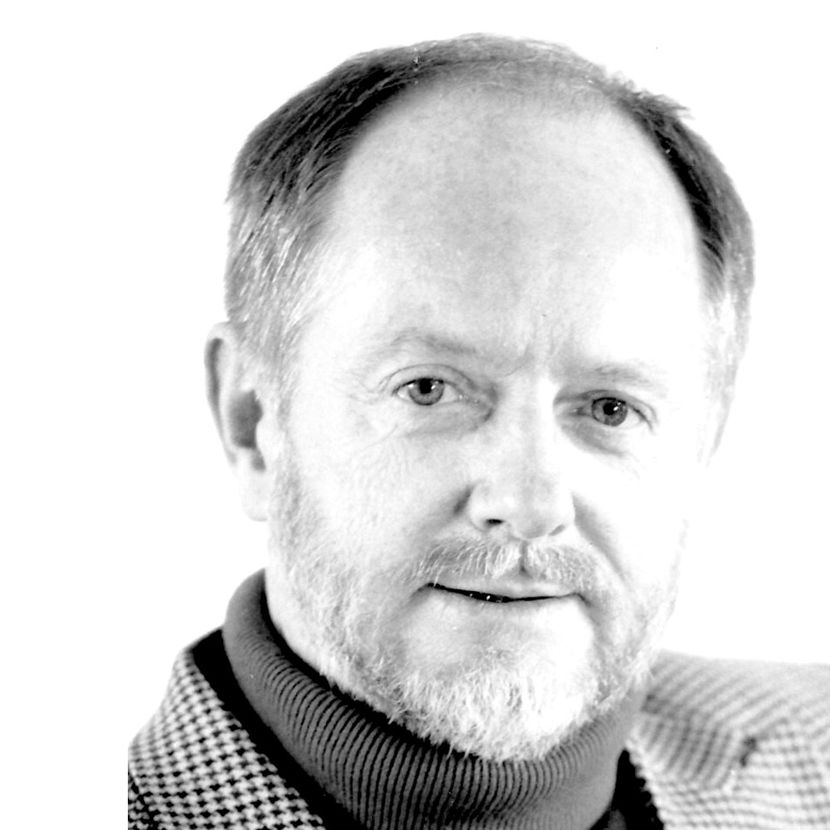
Gerd Rausch
Dipl.-Ing. Gerd Rausch (geb. in 1940 in Keulen) is architect en ontwerper. Hij studeerde architectuur in Keulen en werkte hierna twee jaar voor het ontwerpbureau van prof. Joachim Schürmann. Van 1967 tot 2005 was hij als vaste ontwerper voor BRUNE werkzaam en vormde in deze periode met zijn productontwerp en zijn communicatiedesign in belangrijke mate de uitstraling van het bedrijf. Sinds 2005 wijdt hij zich intensief aan de vrije schilderkunst en speciaal architectuuradvies. Hij is onder andere medeoprichter van de kunstenaarsgroep p e n t i m e n t i.
Gerd Rausch woont en werkt in Keulen.
 Zitmeubelen
Zitmeubelen Tafels
Tafels Kapstoken
Kapstoken Transportmiddelen
Transportmiddelen Restaureren
Restaureren Projecten
Projecten Stof
Stof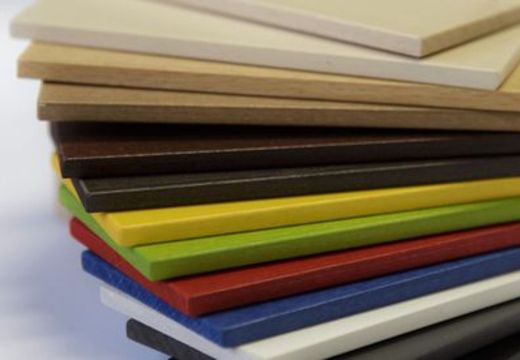 Beits- & Stahlkleuren
Beits- & Stahlkleuren CPL en kunststof zitschalen
CPL en kunststof zitschalen Tafelbladuit- voeringen
Tafelbladuit- voeringen

